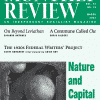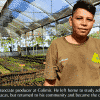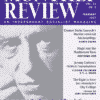
Obfuscation
A new poem by Marge Piercy. | more…

March 2022 (Volume 73, Number 10)
The struggle over schools today requires battles over both the privatization of education and the current attempts to limit its social content and meaning. Those fighting against this changing totality must align themselves with the embattled radical teachers in the trenches. In the famous words of Grace Lee Boggs, more than a half-century ago, it is necessary to create “a new system of education that will have as its means and its end the development of the great masses of people to govern over themselves and administer over things.” | more…

Nature as a Mode of Accumulation: Capitalism and the Financialization of the Earth
From September to November 2021, overlapping with the 2021 UN Climate Change Conference negotiations in Glasgow, three major interrelated developments occurred in global finance. Taken together, these changes mark a turning point in the financial expropriation of the earth and the culmination of a theoretical shift in the dominant economic paradigm aimed at the unlimited accumulation of total capital, which is now seen as including “natural capital.” | more…

The End of the Trilogy
In Beyond Leviathan: Critique of the State, István Mészáros closes a trilogy that was first outlined in Marx’s Theory of Alienation, later greatly developed in Beyond Capital, and is now concluded in this new work. Throughout his immensely rich work, Mészáros developed, amid many original formulations, an increasingly relevant concept: capital’s order of social metabolic reproduction. | more…

A Commune Called ‘Che’: A Socialist Holdout in the Venezuelan Andes
The Che Guevara Commune is far removed from the bustle of Venezuela’s huge coastal cities. You reach it by following a steep winding road from the shores of Lake Maracaibo into La Culata National Park. Lush vegetation and tall bucare trees provide good shade for coffee and cacao, which has only begun to be farmed in recent decades in this region, due to the migration triggered by the construction of the Pan-American Highway along the lake’s perimeter in the 1950s. | more…
Revisiting Marx on Race, Capitalism, and Revolution
Did Karl Marx have a theory of race and capitalism? Not exactly, but he theorized on these issues over four decades and much of what he wrote still speaks to us today. At a time of global and U.S. struggles for liberation in the face of a deeply racialized fascist threat, these writings are worth revisiting. | more…

What 1930s Radicals Totally Knew: Scott Borchert on the Federal Writers’ Project
The Great Depression is almost one century old. Today in the United States we remember this international economic collapse, and the suffering it engendered, by reading novels and essays about it, watching plays, viewing paintings—often forgetting that the U.S. government of that time encouraged and financially supported much of this art. Not only art: the Depression was one of the few times that the federal government ever stepped in to help ordinary people get on their feet. | more…

The United Fruit Co.
This poem was published in volume 18, number 4, of Monthly Review (September 1966). | more…

Confession
A new poem by Raymond Nat Turner. | more…

February 2022 (Volume 73, Number 9)
The COVID-19 pandemic shows no signs of going away, with a new wave of SARS-CoV-2 now occurring in the form of the more readily transmittable Omicron variant. In these circumstances, the issue of vaccine imperialism, dividing the Global North and the Global South, has taken on new significance. | more…

Lukács and the Tragedy of Revolution: Reflections on “Tactics and Ethics”
For Georg Lukács, revolution represented the realm of the objectively possible. He saw the tragedy of action as a necessary element in a movement toward greater human freedom synonymous with historical necessity. | more…

Bury Class Society Before It Buries Us All: Eleanor Burke Leacock’s Vision for a Marxist Feminist Anthropology
Eleanor Burke Leacock taught that transhistorical, universal male dominance is a myth, not a fact. Writing during the grimmest period of Cold War reaction, Leacock put forward a critique of the mainstream U.S. ideology, which took for granted the idea that there were only two genders, in binary opposition to each other, and that these were the direct product of so-called male and female nature. | more…

Magic, Necromancy, and the Nonhuman Turn
Across the humanities and the social sciences, critical attention is being given to the nonhuman as an ecological, philosophical, and political problem—the nonhuman here meaning anything from animals and plants to manufactured objects. Going under names as various as new materialism, political ecology, and object-oriented ontology, these studies comprise a movement that is largely described as the nonhuman turn. | more…